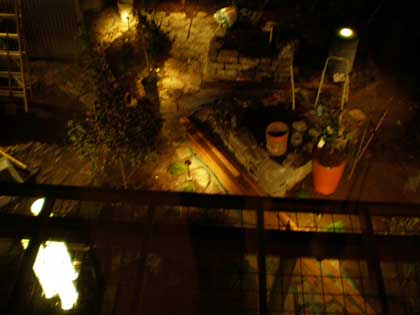eco:darkness falls
You're told incandescent bulbs are bad and waste energy. Our house only has them in the dining area as a sculptural feature. But cumulatively any kind of lighting adds up. We had our garden lights and house lights on:

and I noticed our consumption was an astronomical 3770 Watts. Start turning them off...
I saw the Cellophane house at the MOMA "Home Delivery" show of prefab homes, which has all LED lighting. It's an... interesting space.

and I noticed our consumption was an astronomical 3770 Watts. Start turning them off...
- −300 Watts: garden lights (low voltage) off
- −200W: garden pump off
- −30W: pump lights (low voltage) off
- −200W: dim dining lights (evil incandescents) as low as possible
- −200W: power off dining lights
- −30W: rear fluorescent lamp off
- −200W: power off monster stereo
- −470W: awesome second floor lights (halogen) off
- −430W: living room lights (more halogen) off
- −60W: side light (halogen) off
- −260W: dim downstairs lights (halogen track lights) as low as possible
- −40W: power off downstairs lights
- −80W: dim studio lights (halogen track lights) as low as possible
- −20W: power off studio lights
I saw the Cellophane house at the MOMA "Home Delivery" show of prefab homes, which has all LED lighting. It's an... interesting space.
Labels: eco, electricity

